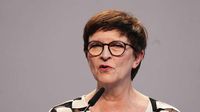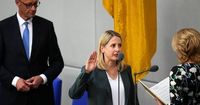In a significant reshuffling of the German government, Chancellor Friedrich Merz has eliminated the position of Commissioner for the Berlin relocation and Bonn compensation in one of his first actions in office. This decision, made on May 8, 2025, has drawn immediate backlash from the Bonn region, where local leaders express concern over the loss of advocacy for the city's interests. However, the newly appointed Minister of Construction, Verena Hubertz, has sought to reassure residents that Bonn will still have a strong voice in the federal government.
Verena Hubertz, born on November 26, 1987, in Trier, has a background in business administration and has been a member of the Bundestag since 2021. As one of the deputy chairpersons of the SPD parliamentary group, her new role as Federal Minister for Housing, Urban Development, and Building marks a significant step in her political career. Hubertz joined the SPD in 2009, motivated by a desire to advocate for a legal minimum wage in Germany, and has since been involved in various initiatives aimed at modernizing the party.
On the same day, the SPD revealed its lineup for the Merz cabinet, with Lars Klingbeil confirmed as Finance Minister and Vice Chancellor. The party's announcement brought clarity to speculation surrounding the allocation of ministerial positions, especially regarding the controversial figure of Saskia Esken, who has faced criticism for her leadership. Reports indicate that Esken will not be included in the new cabinet, with Reem Alabali-Radovan expected to take over the Development Ministry instead.
The SPD's cabinet list includes several key figures: Boris Pistorius as Defense Minister, Bärbel Bas as Labor Minister, and either Sonja Eichwede or Stefanie Hubig as Justice Minister. The party aims for a balanced representation with four women and three men appointed to its side of the cabinet, a move that has been welcomed by many within the party.
Despite the cabinet announcements, the SPD's internal dynamics remain under scrutiny. Critics have pointed out the poor performance of the party in recent elections, particularly under Esken's leadership. Prominent party members have voiced their support for Klingbeil as a potential new leader, although he has yet to announce any candidacy for the position. This internal strife highlights the challenges the SPD faces as it transitions into a new government.
Hubertz's appointment signals a fresh approach to urban development and housing policy in Germany. With her background as a start-up entrepreneur, having co-founded a company that made recipes accessible via an app, she brings a modern perspective to her new role. Her previous engagement in the SPD's initiative for a younger, more diverse party reflects her commitment to innovation and inclusivity within the political landscape.
As the new Minister, Hubertz has emphasized her dedication to addressing the housing crisis and promoting sustainable urban development. "Bonn will have an advocate in me," she reassured constituents, aiming to alleviate concerns about the recent governmental changes. Her focus on urban issues is critical, especially as cities across Germany grapple with rising housing costs and the need for infrastructure improvements.
The cabinet's formation and the elimination of the Bonn compensation position come at a pivotal moment for German politics. With the coalition agreement between the CDU, CSU, and SPD set to be officially signed at noon on May 12, 2025, the government is under pressure to deliver on promises made during the election campaign. This includes commitments to address social inequalities and improve living conditions for citizens.
As the SPD prepares to unveil its complete ministerial team, the anticipation surrounding the announcements reflects broader public interest in how the new government will tackle pressing issues such as climate change, economic recovery, and social justice. The SPD's strategy to present a diverse cabinet is a clear attempt to resonate with voters who are increasingly demanding representation and accountability from their leaders.
In conclusion, the recent changes initiated by Chancellor Merz and the SPD's cabinet appointments signal a new chapter in German politics. With leaders like Verena Hubertz at the helm of important ministries, there is hope for a more responsive and innovative government. However, the challenges ahead, including internal party unity and public expectations, will require careful navigation as the new administration seeks to establish its priorities and make a meaningful impact.





